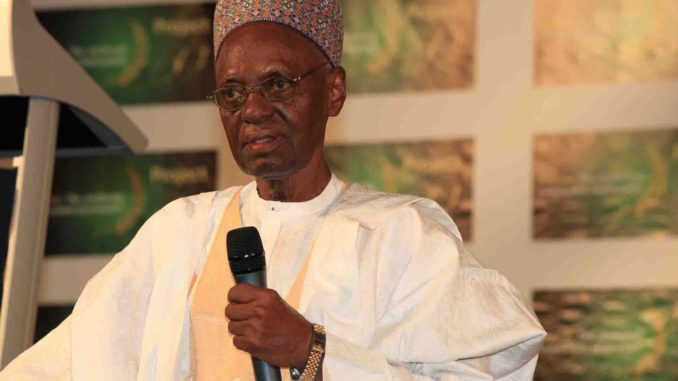
The death of the first executive president of the Federal Republic of Nigeria, Alhaji Shehu Shagari, at the age of 93 on Friday 28, December 2018, at Abuja National Hospital marked the end of an outstanding public career and distinguished service to the nation by a humble and sincere leader who brought dignity and patriotism to Nigeria’s politics.
Considering the outpouring of tributes from eminent Nigerians, it is clear that former President Shagari spared no effort in his quest to improve the life of fellow citizens. The life of service offered by Shagari, who took over the reins of power on October 1, 1979 from the military government led by former head of state, General Olusegun Obasanjo, was characterised by humility and sincerity towards the common good.
Shagari’s rise to political prominence was shaped by divine providence. The former president, who was born in his hometown, Shagari, on February 25, 1925, attended Yabo Elementary School from 1931 to 1935. After his primary education at the Sokoto Middle School from 1936 to 1940, he was at the Government College, Kaduna (later renamed Barewa College, Zaria) between 1941 and 1944. At the end of his studies, he worked as a science teacher in the late 1940s and early 1950s.
The dream to serve his people and advance their welfare pushed the young teacher to join active politics. By 1951, he had become the secretary of the Northern Peoples Congress (NPC) in Sokoto Province. Political breakthrough soon came his way when he was elected a member of the House of Representatives in 1954. Based on his astuteness and sheer dedication to duty, Shagari was appointed parliamentary secretary to Nigeria’s first and only prime minister, Sir Abubakar Tafawa Balewa, in 1956. He also got appointed as minister for commerce and industries (1958-1959), minister of economic development (1959-1960), minister of internal affairs (1962-65) and minister of works (1965-1966), among other key positions.
With the collapse of the First Republic in January 1966, the military appointed him secretary of the Sokoto Province Education Development Fund in 1967. This was followed by yet another appointment as commissioner for establishment in the North Western State (1968-1969). He was soon elevated to the position of federal commissioner for economic development, rehabilitation and reconstruction in 1970 by General Yakubu Gowon.
Other positions held by Shagari under the Gowon military regime included federal commissioner for finance and governor for the World Bank and International Monetary Fund (IMF).
Shagari’s footprints in public service were more glaring when he served as the nation’s first executive president. Emerging from long years of military dictatorship, President Shagari deployed maturity and deft diplomacy in rallying international coalition and support for the then nascent democracy that was later overthrown after four years and three months. During his tenure as president, he pursued goals and programmes crucial to food security and ethical revolution for the country.
Taking advantage of the rising prices of crude oil, he left no stone unturned in making housing, transportation and agriculture the major objectives of his administration. It was under his leadership that several industrial projects, including the Kaduna Refinery, steel and plant rolling mills at Ajaokuta, Delta and Ikot Abasi were completed, among others. Though political commentators accused Second Republic politicians of corruption and other sundry crimes that attracted military intervention on December 31, 1984, the former president was never found wanting.
Since the announcement of his death last Friday, prominent Nigerians have continued to extol the virtues of an unparalleled political leader whose past is best remembered for its humanness and non-interference with party politics. The former president, who was a democrat to the core and did everything within his purview to promote and deepen democracy, has remained a beacon of good governance and promotion of humility in the service of the nation. Not a meddlesome political leader that is in quest for relevance, Shagari returned to his hometown and embraced a quiet life unencumbered by intrigues and controversy. Having served the nation at the highest level, the school teacher came to the conclusion that nationhood, being an unfinished process, must be passed on to incoming leaders to do their own bit.
Shagari’s public service career is an inspiring profile of what a humble and sincere leadership can do for a nation. His passage, no doubt, leaves a void difficult to fill. He will always be remembered as one of the nation’s best democratic presidents who bestrode Nigeria’s corridors of power with humility and great respect for the rule of law.
END

Be the first to comment